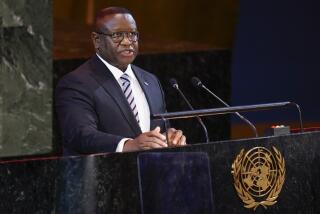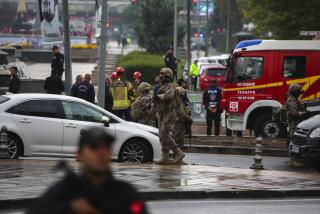Croatia Leader’s Palace Attacked : Civil war: Officials unhurt by rockets as Yugoslav warplanes strike at central Zagreb for the first time. Raid shatters any hope of renegade army heeding ultimatum.
- Share via
LJUBLJANA, Slovenia — Yugoslav warplanes fired two rockets into Croatia’s presidential palace Monday, scoring a direct hit on the seat of the Zagreb leadership as well as on hopes for a negotiated end to the civil war.
The attack, the first on the heart of the Croatian capital, came only hours before the expiration of a three-month freeze on secession by Croatia and Slovenia, which stirred fears that the Serbian-led forces were pressing an all-out offensive against rival Croatia in hopes of a conquest before foreign governments could recognize the new nations and intercede.
The attack on Zagreb’s Gornyi Grad--the historic “upper city” of Hapsburg mansions, stately villas and a medieval cathedral--shattered any remaining thoughts that the renegade Yugoslav forces would heed a European ultimatum to stop fighting or face crippling economic sanctions.
Broken glass carpeted the square stretching between the Parliament building and the presidential palace, and roof tiles were torn off the district’s 14th-Century cathedral, St. Mark’s.
Yugoslavia’s federal president and prime minister, Croats Stipe Mesic and Ante Markovic, were at the government headquarters, along with Croatian President Franjo Tudjman, when the attack occurred. None of the leaders were injured, although several other Zagreb residents were hurt by falling debris.
Markovic called the attack “attempted murder” by the Yugoslav forces over which his feeble government has lost control. “It was by sheer miracle that we stayed alive,” he was quoted as saying by the Tanjug news agency.
The 3 p.m. raid coincided with a decision by Slovenian leaders to insist that all federal forces leave the republic by Oct. 18.
Tiny Slovenia saw its Alpine wonderland transformed into a war zone in the first days after announcing sovereignty along with Croatia on June 25.
But since a cease-fire brokered by the European Community on the Adriatic island of Brioni on July 8, federal forces have gradually retreated from Slovenia to concentrate their firepower on neighboring Croatia.
In Zagreb, the attack on Gornyi Grad caught many Croats off guard, since residents have come to ignore the air raid sirens that wail repeatedly throughout the day. Bomb shelters filled quickly after the rocket strikes, and many residents were still taking cover hours later.
“What do they want, that we all be killed?” cried Gordana Krznaric, 33, a pharmacist, as she huddled in a suburban shelter.
The U.S. Consulate in Zagreb urged all Americans, including journalists, to leave the republic.
The attack followed a warning from a regional federal army commander, Gen. Andrije Raseta, that the capital would be hit if Croatian national guardsmen refused to end their siege of federal bases in the republic.
The army has suffered mass desertions since Croatian forces surrounded several barracks in the republic and cut off power and supplies.
Tudjman over the weekend called for a full mobilization in Croatia after army forces moved to within 10 miles of Zagreb and executed a major assault on the strategic city of Karlovac, severing the Croatian capital from its seacoast.
Soviet President Mikhail S. Gorbachev had appealed early Monday for Yugoslav leaders to heed European efforts to bring peace. Gorbachev’s message was carried by both the Tass and Tanjug news agencies.
Serbia, the largest of Yugoslavia’s six republics and adamantly opposed to Croatian independence, has used its influence with the federal army to back Serbian guerrillas fighting secession. They have taken control of about one-third of Croatia and have rained a punishing barrage of shells on the once-lucrative Adriatic coastline where Yugoslavia’s most famous resorts are situated.
In addition to the attack on Zagreb, Yugoslav air and naval forces fired on the ports of Zadar and Split and continued to shell scenic villages surrounding the ancient walled city of Dubrovnik, considered the pearl of Croatia’s tourism industry.
The death toll from three months of fighting is thought to be nearly 1,000, although some speculate that it could be more than twice that figure.
Croats accuse Serbia and the army of aggression aimed at conquering vast territories to create a “greater Serbia” from Yugoslavia’s ruins. The Serbs say they are fighting for the rights of Croatia’s 600,000 ethnic Serbs, who fear they would become victims of atrocities in an independent Croatia.
Under the Brioni accord, Croatia and Slovenia agreed to suspend moves toward independence for three months to allow time for European mediators to arrange talks to peacefully dissolve the Yugoslav alliance. The moratorium expired Monday at midnight, with all sides agreed that no progress could be claimed toward a negotiated settlement.
“We are not prepared to postpone sovereignty any longer because we can analyze what has resulted from the last three months--nothing,” said Slovenia’s deputy prime minister, Andrej Ocvirk.
Matjaz Sinkovec, head of the Slovenian Parliament’s Foreign Affairs Committee, said the West’s refusal to accept Yugoslavia’s demise has encouraged army aggression.
“With the war raging on as it is, we have to ask ourselves if we aren’t just making it easier for the Serbs and the military to have their way with Croatia while we just sit around and talk about how it should be,” Sinkovec said.
Slovenia’s new red, white and blue flag adorned with a snow-capped mountain fluttered from standards throughout this capital city in honor of the first day of unencumbered independence. But the atmosphere in official circles was anything but celebratory.
Slovenian Foreign Minister Dimitrij Rupel said he will be taking his republic’s case for recognition to The Hague later this week, but he appeared doubtful of immediate relief.
“We are going to have to wait for recognition, unless something so drastic happens that foreign countries will use recognition as an instrument,” Rupel said.
European Community foreign ministers warned over the weekend that they would consider a trade embargo, including a cutoff of oil supplies, against any republics that failed to abide by its latest truce by midnight Monday.
Rupel said he fears that the ultimatum will complicate further Slovenian moves toward independence, but Sinkovec said he thinks the EC is warming up to what he called “de facto recognition” of Slovenia, because it is the only republic that has fulfilled all terms of the cease-fire.
Because foreign governments still recognize a Yugoslav nation instead of the individual republics, Slovenia and Croatia are denied financial credits and international aid needed to restructure their economies after four decades of Communist central planning.
Despite the official snub, Slovenia intends to go ahead with issuing its own currency this month, severing the republic from the Yugoslav monetary system that now suffers at least 200% inflation. Sinkovec said the move could lead to financial chaos in the short run but that Slovenes are united in their desire to escape the doomed federal economy.
Slovenian officials have said they will not put off independence any longer. On Monday, the Parliament ratified a call for the last 3,000 or so federal troops still deployed in Slovenia to withdraw within 10 days.
Ljubljana asked that European Community cease-fire monitors complete their mission as scheduled on Sunday. If the EC diplomats want to use Slovenia as a foothold for intervening in the conflict in Croatia, Slovenia is open to negotiating a bilateral agreement, Sinkovec said, pushing a move that would be tantamount to Western recognition of his republic.
In Washington, State Department spokesman Richard Boucher said the Bush Administration is considering joining the EC in imposing economic sanctions against the Yugoslav factions.
Special correspondent Danica Kirka in Zagreb, Yugoslavia, contributed to this report.
More to Read
Sign up for Essential California
The most important California stories and recommendations in your inbox every morning.
You may occasionally receive promotional content from the Los Angeles Times.














